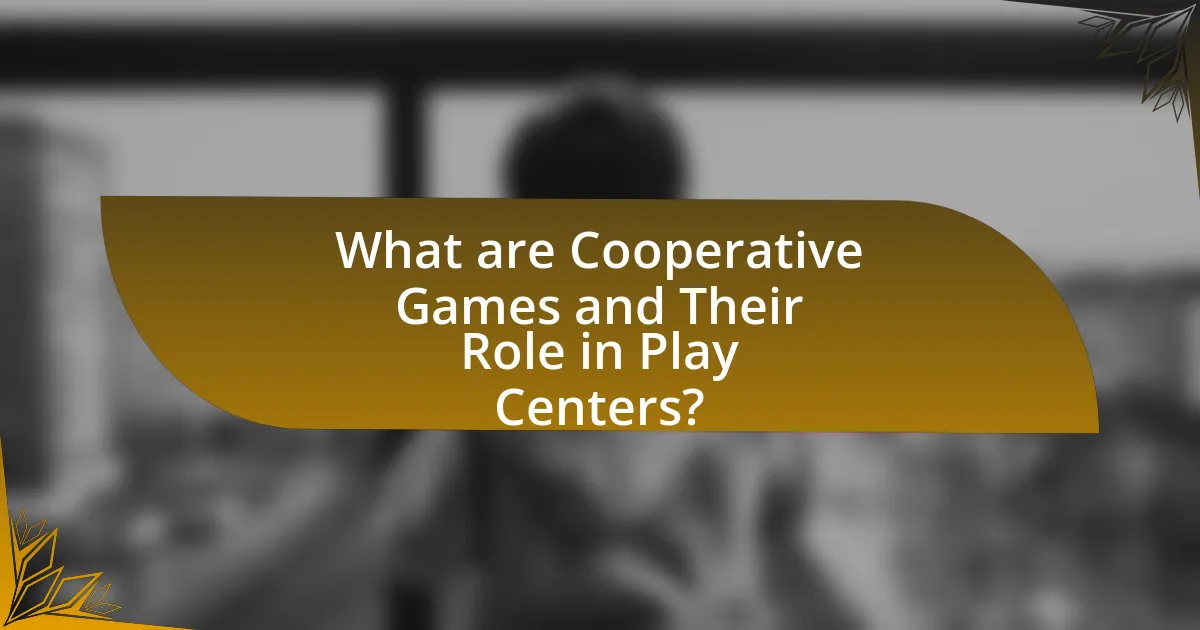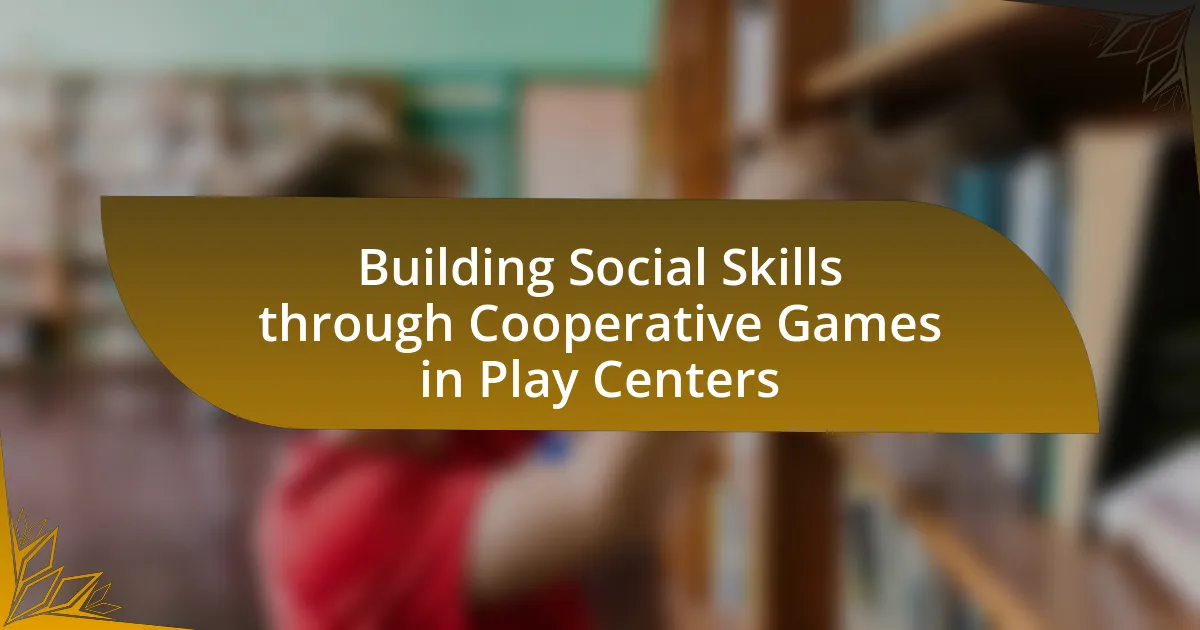Cooperative games are activities designed to enhance teamwork and collaboration among children, focusing on collective success rather than competition. These games play a vital role in play centers by fostering essential social skills such as communication, empathy, and conflict resolution. Research indicates that participation in cooperative games leads to improved social interactions and emotional regulation, making them crucial for child development. The article explores the characteristics of cooperative games, their differences from competitive games, and the types commonly used in play centers, while also addressing the challenges of implementation and strategies for effective facilitation.

What are Cooperative Games and Their Role in Play Centers?
Cooperative games are activities designed to promote teamwork and collaboration among participants, emphasizing collective success rather than individual competition. In play centers, these games play a crucial role in fostering social skills, as they encourage children to communicate, share, and work together towards common goals. Research indicates that engaging in cooperative games enhances interpersonal relationships and builds trust among peers, which is essential for social development in early childhood settings. For instance, a study published in the Journal of Educational Psychology found that children who regularly participated in cooperative play exhibited improved social interactions and conflict resolution skills.
How do Cooperative Games differ from Competitive Games?
Cooperative games differ from competitive games primarily in their objectives; cooperative games focus on teamwork and collective success, while competitive games emphasize individual achievement and rivalry. In cooperative games, players work together to achieve a common goal, fostering collaboration and communication, which are essential for building social skills. For example, games like “Pandemic” require players to strategize collectively to overcome challenges, reinforcing the importance of cooperation. In contrast, competitive games like “Monopoly” pit players against each other, often leading to conflict and a focus on winning at the expense of others. This fundamental difference shapes the social dynamics and learning outcomes associated with each type of game.
What are the key characteristics of Cooperative Games?
Cooperative games are characterized by their emphasis on teamwork and collective success rather than individual competition. These games require players to work together to achieve common goals, fostering collaboration and communication skills. Additionally, cooperative games often involve shared resources and mutual benefits, where the success of one player contributes to the success of the group. Research indicates that such games enhance social skills, as they encourage players to negotiate, strategize, and resolve conflicts collectively, ultimately promoting a sense of community and belonging among participants.
Why are Cooperative Games important for child development?
Cooperative games are important for child development because they foster essential social skills such as teamwork, communication, and problem-solving. These games require children to work together towards a common goal, which enhances their ability to collaborate and understand different perspectives. Research indicates that participation in cooperative play can lead to improved social interactions and emotional regulation among children, as they learn to negotiate roles, share resources, and resolve conflicts. For instance, a study published in the Journal of Educational Psychology found that children who engaged in cooperative learning activities demonstrated higher levels of social competence compared to those who participated in competitive games. This evidence underscores the significance of cooperative games in nurturing social skills critical for children’s overall development.
What types of Cooperative Games are commonly used in Play Centers?
Cooperative games commonly used in play centers include team-building activities, trust exercises, and problem-solving challenges. These games are designed to promote collaboration, communication, and social interaction among participants. For example, team-building activities like “Human Knot” require players to work together to untangle themselves without letting go of each other’s hands, fostering teamwork and problem-solving skills. Trust exercises, such as “Trust Fall,” encourage participants to rely on one another, enhancing trust and communication. Problem-solving challenges, like scavenger hunts, require groups to strategize and collaborate to achieve a common goal, reinforcing social skills and cooperation.
How do team-building games promote social interaction?
Team-building games promote social interaction by creating opportunities for individuals to collaborate, communicate, and build relationships in a structured environment. These games often require participants to work together towards a common goal, fostering teamwork and enhancing interpersonal skills. Research indicates that engaging in cooperative activities can lead to improved social cohesion and trust among team members, as evidenced by a study published in the Journal of Applied Psychology, which found that team-building exercises significantly increased group performance and interpersonal relationships.
What are some examples of popular Cooperative Games for children?
Some examples of popular cooperative games for children include “The Floor is Lava,” “Team Juggle,” and “Capture the Flag.” These games encourage teamwork and communication among participants. “The Floor is Lava” requires players to navigate a space without touching the ground, fostering collaboration to find safe spots. “Team Juggle” involves tossing a ball among team members, promoting coordination and trust. “Capture the Flag” encourages strategic planning and teamwork to achieve a common goal. Each of these games has been widely used in educational and recreational settings to enhance social skills among children.

How do Cooperative Games Foster Social Skills?
Cooperative games foster social skills by encouraging teamwork, communication, and problem-solving among participants. These games require players to work together towards a common goal, which enhances their ability to collaborate effectively. Research indicates that children who engage in cooperative play demonstrate improved social interactions, as they learn to negotiate roles, share resources, and resolve conflicts. For instance, a study published in the Journal of Educational Psychology found that children participating in cooperative learning activities showed significant gains in social competence compared to those in competitive settings. This evidence supports the notion that cooperative games are instrumental in developing essential social skills.
What specific social skills can be developed through Cooperative Games?
Cooperative games can develop specific social skills such as teamwork, communication, empathy, and conflict resolution. Teamwork is fostered as participants must collaborate to achieve common goals, enhancing their ability to work effectively with others. Communication skills improve as players articulate their thoughts and strategies, facilitating clearer interactions. Empathy is cultivated through understanding and supporting teammates’ perspectives and feelings during gameplay. Additionally, conflict resolution skills are honed as players navigate disagreements and find mutually acceptable solutions, promoting a harmonious group dynamic. Research indicates that these skills are essential for social development in children, as highlighted in studies on cooperative learning environments.
How do Cooperative Games enhance communication skills?
Cooperative games enhance communication skills by fostering teamwork and requiring players to share information and strategies effectively. These games create an environment where participants must articulate their thoughts, listen actively, and negotiate roles, which directly improves verbal and non-verbal communication. Research indicates that engaging in cooperative play can lead to increased social interaction and improved conflict resolution skills, as players learn to express their ideas clearly and understand others’ perspectives. For example, a study published in the Journal of Educational Psychology found that children who participated in cooperative learning activities demonstrated significant improvements in communication abilities compared to those who engaged in competitive games.
In what ways do these games promote empathy and teamwork?
Cooperative games promote empathy and teamwork by requiring players to collaborate towards a common goal, fostering communication and understanding among participants. These games often involve role-playing or shared challenges that encourage players to consider others’ perspectives and feelings, which enhances emotional intelligence. Research indicates that children who engage in cooperative play demonstrate improved social skills, as they learn to negotiate, share, and resolve conflicts effectively. For instance, a study published in the “Journal of Educational Psychology” found that children participating in cooperative learning activities showed significant gains in empathy and teamwork compared to those in competitive settings.
Why is the environment of Play Centers conducive to building social skills?
The environment of Play Centers is conducive to building social skills because it promotes interaction among children through structured and unstructured play. In these settings, children engage in cooperative games that require teamwork, communication, and problem-solving, which are essential components of social skill development. Research indicates that children who participate in group activities in play environments are more likely to develop empathy, share resources, and resolve conflicts effectively. For instance, a study published in the Journal of Child Psychology and Psychiatry found that children who regularly engage in cooperative play demonstrate improved social competence and emotional regulation. This evidence supports the notion that Play Centers provide an ideal atmosphere for fostering essential social skills.
How does the layout of Play Centers facilitate interaction?
The layout of Play Centers facilitates interaction by creating open spaces and strategically placed activity zones that encourage children to engage with one another. These designs often include communal areas, such as large play structures and seating arrangements, which promote socialization and cooperative play. Research indicates that environments designed for interaction can enhance social skills development, as children are more likely to collaborate and communicate when they are in close proximity to peers. For instance, a study published in the Journal of Play Therapy found that children in play environments with accessible group activities exhibited higher levels of cooperative behavior compared to those in isolated settings.
What role do facilitators play in guiding social interactions during games?
Facilitators play a crucial role in guiding social interactions during games by creating an inclusive environment that encourages communication and teamwork among participants. They actively monitor group dynamics, provide support, and intervene when necessary to ensure that all players are engaged and collaborating effectively. Research indicates that facilitators can enhance social skills development by modeling positive interactions and offering constructive feedback, which helps participants learn to navigate social situations more adeptly. For instance, studies have shown that structured play led by facilitators can significantly improve children’s ability to cooperate and resolve conflicts, thereby reinforcing the importance of their role in fostering social skills through cooperative games.

What are the Challenges and Solutions in Implementing Cooperative Games?
The challenges in implementing cooperative games include lack of participant engagement, difficulty in fostering teamwork, and varying skill levels among players. These challenges can lead to ineffective gameplay and hinder the development of social skills. Solutions to these challenges involve designing games that are inclusive and adaptable, providing clear instructions, and facilitating group discussions to enhance communication. Research indicates that structured debriefing sessions after gameplay can significantly improve teamwork and social interaction, as highlighted in studies on cooperative learning environments.
What common challenges do Play Centers face when introducing Cooperative Games?
Play Centers commonly face challenges such as resistance from children, lack of understanding of game rules, and difficulty in fostering teamwork. Resistance from children often arises due to unfamiliarity with cooperative gameplay, leading to reluctance in participation. Additionally, when introducing new cooperative games, staff may encounter issues with children not grasping the rules quickly, which can hinder engagement and enjoyment. Furthermore, fostering teamwork can be challenging as some children may struggle with communication and collaboration, essential components of cooperative games. These challenges can impede the successful implementation of cooperative games aimed at building social skills.
How can facilitators address resistance from children in participating?
Facilitators can address resistance from children in participating by creating a supportive and engaging environment that fosters trust and encourages involvement. Establishing clear communication and actively listening to children’s concerns can help facilitators understand the reasons behind their resistance. For instance, using positive reinforcement and offering choices in activities can empower children, making them feel more in control and willing to participate. Research indicates that children are more likely to engage when they perceive the activity as enjoyable and relevant to their interests, highlighting the importance of tailoring activities to their preferences.
What strategies can be employed to ensure inclusivity in games?
To ensure inclusivity in games, developers can implement strategies such as designing adaptive gameplay mechanics, incorporating diverse character representation, and facilitating accessible game controls. Adaptive gameplay mechanics allow players of varying skill levels to participate meaningfully, ensuring that everyone can engage with the game. Diverse character representation fosters a sense of belonging among players from different backgrounds, enhancing their connection to the game. Accessible game controls, including customizable settings for players with disabilities, ensure that all individuals can enjoy the gaming experience. Research indicates that inclusive design not only broadens the player base but also enhances overall player satisfaction and engagement, as seen in studies by the International Game Developers Association, which highlight the positive impact of inclusivity on community building within gaming environments.
What best practices can enhance the effectiveness of Cooperative Games?
To enhance the effectiveness of Cooperative Games, it is essential to establish clear objectives and roles for participants. This clarity ensures that all players understand their contributions and the game’s purpose, fostering collaboration. Research indicates that structured roles can lead to improved communication and teamwork, as seen in studies where defined responsibilities increased engagement and success rates in group tasks. Additionally, incorporating debriefing sessions after gameplay allows participants to reflect on their experiences, reinforcing learning outcomes and social skills development. This practice has been shown to deepen understanding and retention of cooperative strategies, as evidenced by educational frameworks that emphasize reflection as a key component of experiential learning.
How can facilitators create a supportive atmosphere for children?
Facilitators can create a supportive atmosphere for children by fostering an inclusive environment that encourages collaboration and communication. This can be achieved through the implementation of cooperative games that promote teamwork, allowing children to engage with one another in a positive manner. Research indicates that cooperative learning strategies enhance social skills and emotional well-being among children, as they learn to share, negotiate, and resolve conflicts together. For instance, a study published in the Journal of Educational Psychology found that children participating in cooperative activities showed significant improvements in social interactions and peer relationships. By prioritizing these elements, facilitators can effectively cultivate a nurturing space where children feel valued and supported.
What tips can be used to adapt games for different age groups?
To adapt games for different age groups, modify the complexity of rules and objectives based on developmental stages. Younger children benefit from simpler rules and shorter game durations to maintain engagement, while older children can handle more intricate strategies and longer playtimes. For instance, a game like tag can be adapted by introducing variations such as “freeze tag” for younger players, which simplifies the concept of tagging and adds an element of teamwork. Research indicates that age-appropriate adaptations enhance participation and social interaction, as seen in studies where cooperative games improved social skills among children aged 4 to 12.
How can parents support the development of social skills through Cooperative Games?
Parents can support the development of social skills through cooperative games by actively engaging their children in activities that require teamwork and communication. These games encourage children to work together towards a common goal, fostering skills such as sharing, negotiation, and conflict resolution. Research indicates that cooperative play enhances social competence, as children learn to understand and respect different perspectives while collaborating with peers. For example, a study published in the Journal of Educational Psychology found that children who participated in cooperative learning activities showed significant improvements in social interactions and problem-solving abilities compared to those who engaged in competitive play. By facilitating regular opportunities for cooperative games, parents can effectively nurture their children’s social development.
What activities can parents do at home to reinforce skills learned in Play Centers?
Parents can engage their children in cooperative games at home to reinforce skills learned in Play Centers. Activities such as team-based board games, group puzzles, and collaborative art projects encourage communication, teamwork, and problem-solving. These activities mirror the social interactions experienced in Play Centers, fostering the same skills in a familiar environment. Research indicates that cooperative play enhances social development, as children learn to negotiate, share, and empathize with peers, which are essential components of social skills.
How can parents encourage their children to engage in Cooperative Games outside of structured environments?
Parents can encourage their children to engage in cooperative games outside of structured environments by creating opportunities for unstructured play that emphasizes teamwork and collaboration. For instance, parents can organize family outings to parks where children can participate in group activities like scavenger hunts or team sports, fostering a sense of cooperation. Research indicates that children who engage in cooperative play develop better social skills, as they learn to communicate, negotiate, and resolve conflicts effectively. By providing a supportive environment and modeling cooperative behavior, parents can enhance their children’s ability to work together with peers in various settings.
